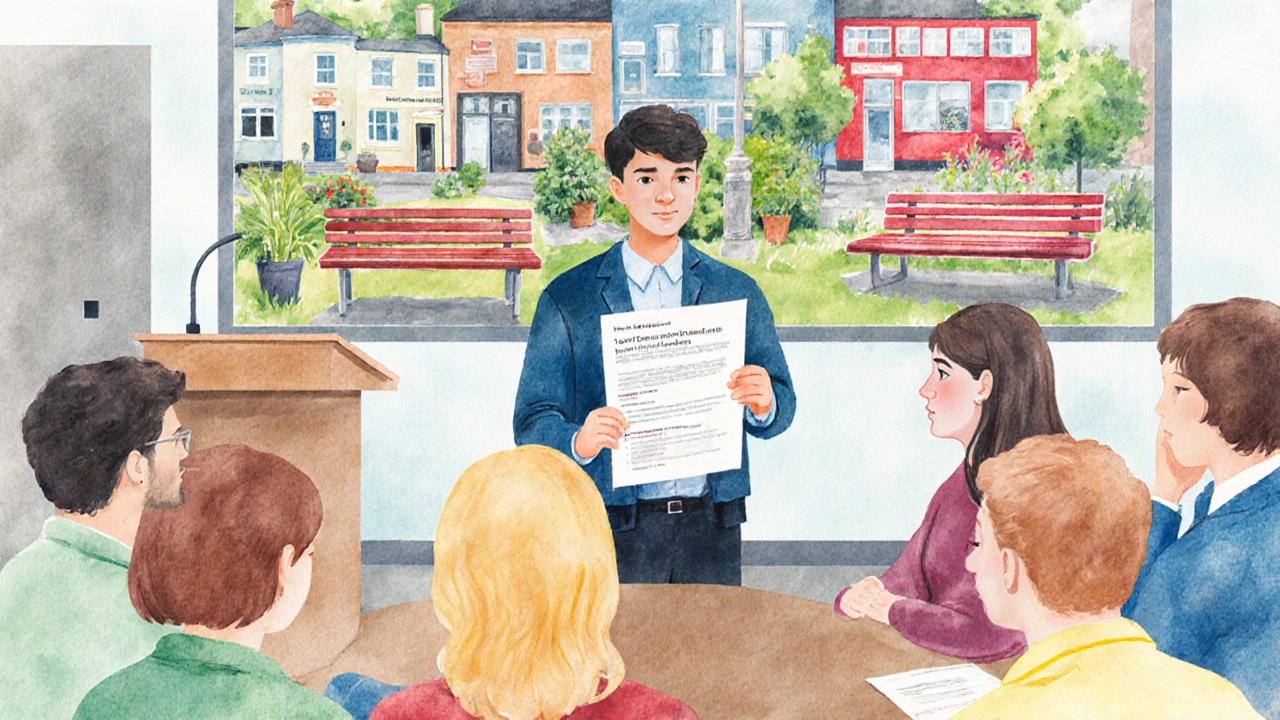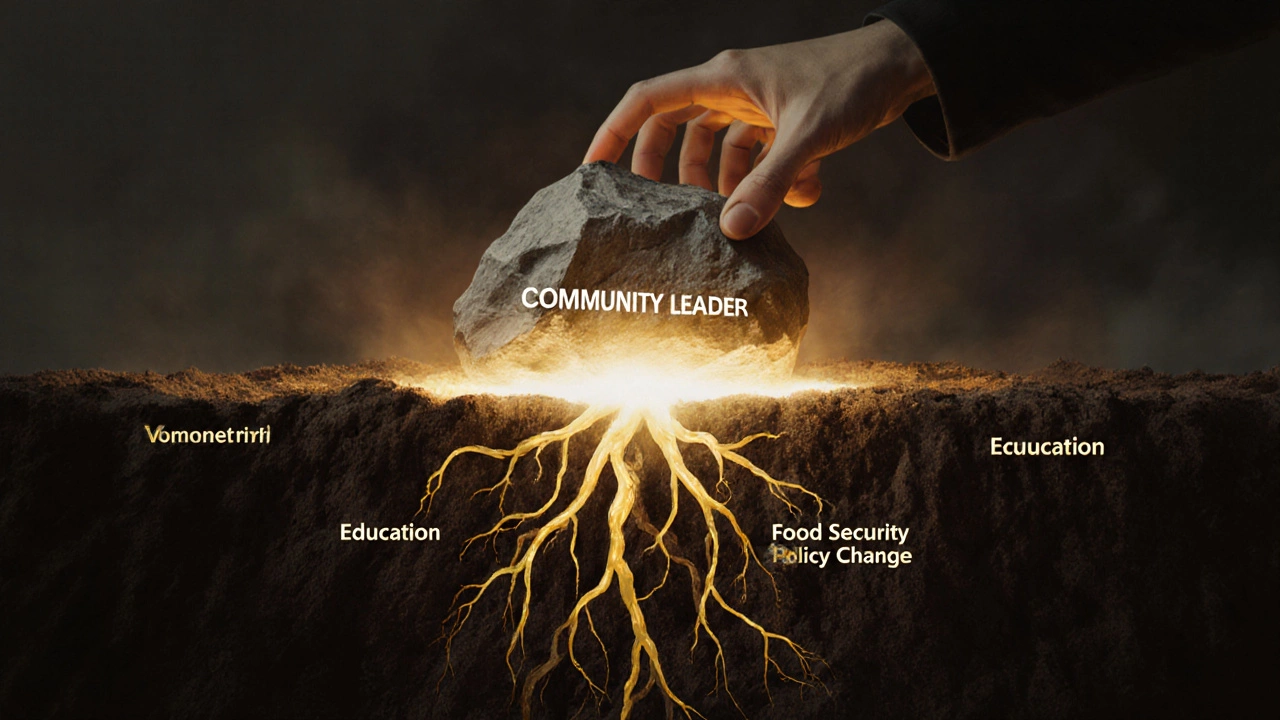Community Contribution Word Finder
Find Your Perfect Term
Describe your community work below. We'll help you find the most accurate and powerful term to describe what you do.
When to Use Each Term
| Term | Best For | Why It Works |
|---|---|---|
| Community Contributor | Resumes, bios, general descriptions | Inclusive, accurate, and empowering for all types of community work |
| Civic Engagement | Formal reports, academic writing, policymakers | Carries authority and is used in policy discussions |
| Community Service | School programs, court-mandated hours, public benefit focus | Emphasizes the public good without sounding punitive |
| Nonprofit Worker | Highlighting professional skills, responsibilities | Acknowledges expertise regardless of pay status |
| Community Leader | Driving change, inspiring others, creating lasting impact | Honors initiative and organizational change |
People say they 'volunteer' all the time-but does that word really capture what they’re doing? If you’re spending weekends packing food boxes, tutoring kids after school, or helping clean up a local park, you’re not just giving time. You’re building community. You’re showing up when it matters. So why do we keep using a word that sounds optional, even passive?
"Volunteer" comes from Latin voluntarius, meaning "of one’s own will." That sounds noble. But in practice, it’s become a limp word. It’s used in grant applications, on resumes, and in charity newsletters. It’s safe. It’s polite. But it doesn’t carry weight.
When you say "I volunteer at the food bank," it sounds like you drop by when you have time. But if you’re there every Tuesday and Thursday, rain or shine, managing inventory, training new helpers, and knowing every regular by name-that’s not volunteering. That’s commitment. That’s leadership. And we need words that match the reality.
Why "volunteer" falls short
Think about the last time you heard someone say, "I volunteer at the animal shelter." What do you picture? Maybe someone walking dogs on weekends. Now imagine that person is the one who started the shelter’s adoption program, raised $20,000 in donations last year, and trains every new staff member. That’s not volunteering. That’s running a vital part of the organization.
"Volunteer" hides the skill, the responsibility, the impact. It makes people think it’s just time-filling. But most people who show up regularly aren’t just passing time-they’re solving problems. They’re managing budgets, coordinating teams, handling crises. Yet the word "volunteer" makes their work sound like a hobby.
Even worse, it can discourage people from stepping up. If you think volunteering means showing up once a month to fold flyers, you might not realize you could lead a team, design a program, or advocate for policy change. The word limits expectations.
Stronger alternatives to "volunteer"
Here are five real, powerful words that actually describe what people do-and why they matter.
Community contributor
This is the most versatile replacement. It doesn’t assume unpaid work. It doesn’t imply low effort. A community contributor is someone who adds value to the neighborhood-whether through time, skills, money, or influence. A retired teacher tutoring kids? Community contributor. A local business owner donating supplies? Community contributor. A teenager organizing a clothing drive? Community contributor.
This term works in grant proposals, job applications, and casual conversations. It’s inclusive. It’s accurate. And it doesn’t sound like an afterthought.
Civic engagement
"Civic engagement" is the term used by researchers, city planners, and public policy experts. It means active participation in shaping community life. That includes voting, attending town halls, serving on boards, and yes-helping at shelters or food banks.
It’s not just about showing up. It’s about being part of the system. If you’re helping design a new youth program for the local council, you’re not volunteering. You’re engaging civically. This word carries authority. It’s used in reports from the National Conference on Citizenship and the OECD. It’s not flashy, but it’s respected.
Community service
"Community service" is older, but still strong. It’s used in schools, courts, and nonprofit programs. Unlike "volunteer," it implies obligation to the community-not just personal choice. That’s important. Some people do community service because they have to. Others do it because they believe in it. Either way, the phrase focuses on the outcome: service to the public.
It’s not perfect. It can sound punitive if used in the wrong context. But when paired with positive language-"dedicated community service" or "long-term community service"-it becomes a badge of honor.
Nonprofit worker
Yes, you read that right. If you’re working 15 hours a week at a nonprofit, managing volunteers, running events, and writing funding proposals-you’re a worker. Not a helper. Not a sidekick. A worker.
Most nonprofits operate with 70-90% of their staff being unpaid. But their roles are real. Their responsibilities are professional. Calling them "volunteers" erases their expertise. Calling them "nonprofit workers" recognizes their contribution as labor. It’s honest. And it’s becoming more common in advocacy circles.
Some people worry this sounds too corporate. But if you’re managing a budget, training staff, or evaluating program outcomes, you’re doing professional work. You deserve a professional title.
Community leader
This one’s for the people who don’t just show up-they change things. The person who turned a vacant lot into a community garden. The one who convinced the city to install benches at the bus stop. The parent who started a weekly homework club after noticing kids had nowhere to study.
These aren’t volunteers. They’re leaders. They identified a need, mobilized others, and created lasting change. "Community leader" doesn’t just describe what they do-it honors what they’ve built.
Use this term when someone has taken initiative beyond tasks. When they’ve inspired others. When their work has ripple effects.
When to use each word
Not every situation needs a new word. But choosing the right one makes a difference.
- Use community contributor for resumes, bios, or general descriptions. It’s safe, clear, and empowering.
- Use civic engagement in formal reports, academic writing, or when talking to policymakers.
- Use community service in school programs, court-mandated hours, or when emphasizing public benefit.
- Use nonprofit worker when you want to highlight professional skills, responsibility, or full-time effort-even if unpaid.
- Use community leader when someone has driven change, inspired others, or created something new.
For example:
- Instead of: "I volunteer at the homeless shelter." → Try: "I’m a community contributor at the Edinburgh Night Shelter, coordinating meal deliveries and training new staff."
- Instead of: "She volunteers on the board." → Try: "She’s a community leader who helped launch the city’s first youth mental health outreach program."
- Instead of: "We need more volunteers." → Try: "We need more community contributors to help us expand our tutoring network."

Why changing the language matters
Words shape perception. If you call someone a "volunteer," you might be unintentionally saying their work isn’t essential. But if you call them a community leader, you’re saying their role is vital.
This isn’t just about semantics. It’s about respect. It’s about attracting better talent. If you want skilled professionals to join your cause, don’t ask them to "volunteer." Ask them to lead. To contribute. To be part of something that matters.
Organizations that use stronger language see higher retention, more skilled participation, and better funding. A 2024 study by the Scottish Centre for Volunteering found that nonprofits using "community contributor" instead of "volunteer" in outreach materials saw a 37% increase in long-term engagement from people aged 25-45.
When you change the word, you change the expectation. And when you raise the expectation, you raise the impact.
Real examples from Edinburgh
At the Leith Community Food Hub, staff stopped saying "our volunteers" and started saying "our community contributors." They updated their website, their newsletters, even their thank-you cards. Within six months, the number of people staying on for more than a year jumped from 18% to 52%.
At the Edinburgh Youth Project, they stopped calling teens "volunteers" and started calling them "youth leaders." Suddenly, those same teens were applying for grants, speaking at council meetings, and mentoring younger kids. One 16-year-old told a reporter: "I’m not just helping out. I’m leading something that’s going to last."
That’s the power of language.

What you can do today
You don’t need permission to change the words you use. Start small.
- Next time you describe your work, replace "volunteer" with one of the alternatives above.
- Ask your organization to update their language on their website and social media.
- When you thank someone, say: "Thank you for being a community contributor" instead of "Thanks for volunteering."
- When you write a reference or recommendation, use "community leader" or "nonprofit worker" if it fits.
Language doesn’t just reflect reality-it creates it. The more we use words that honor the depth of people’s work, the more we’ll see that work valued, supported, and sustained.
Is "volunteer" still okay to use?
Yes-but only in casual, informal settings. If you’re talking to a friend over coffee, saying "I volunteer at the library" is perfectly fine. But in professional, grant, or public-facing contexts, it’s too weak. It doesn’t reflect the skill, commitment, or impact most people bring. Choose stronger words when you want to be taken seriously.
Can I call myself a nonprofit worker if I’m unpaid?
Absolutely. Many nonprofits operate with mostly unpaid staff who handle the same responsibilities as paid employees: managing programs, leading teams, tracking outcomes. Calling them "volunteers" erases their expertise. "Nonprofit worker" acknowledges their role as essential labor-not charity. It’s a term gaining traction in the UK and US nonprofit sector for this exact reason.
What if my organization can’t afford to pay people?
You don’t need to pay people to honor their work. Language costs nothing. Calling someone a "community leader" or "contributor" doesn’t change their pay-it changes how they feel about their role. People stay longer, bring more ideas, and recruit others when they feel respected. Stronger language builds stronger teams-even without money.
Does this apply to youth and students?
Yes-especially for young people. Calling a teenager a "volunteer" can make their work feel temporary or insignificant. Calling them a "youth leader," "community contributor," or "service partner" gives them legitimacy. Schools and youth programs in Scotland that made this switch reported higher retention and more ambitious projects from teens.
Is this just political correctness?
No. This isn’t about being trendy. It’s about accuracy. If you’re running a program, managing a team, or solving real problems, you’re doing work. Words should match reality-not soften it. This shift is happening because people are tired of their effort being minimized. It’s about dignity, not decoration.
Next steps
Start using one new word this week. Replace "volunteer" with "community contributor" in your next email or social post. Notice how people respond. See how it changes the tone. You might find that others start using it too.
Language is a tool. Use it well.
